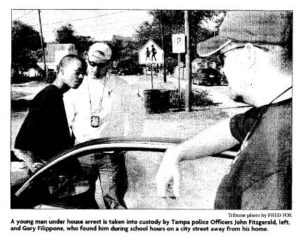Patrols Aim to Curb Crime by Catching Students Skipping School
 By Valerie Kalfrin
By Valerie Kalfrin
The Tampa Tribune, Jan. 29, 2006
2006 Florida Press Club Award Winner: Excellence in Crime Reporting
TAMPA — Sixteen and in handcuffs, Ja’quan Glymp hitches up his jeans with tattooed hands — “Money” on the back of the right one and “Maker” on the left.
The Middleton High School student is on home detention for felony burglary and grand theft charges, Tampa police records show. He must be at home or in school during the day — not standing on the sidewalk in the 3200 block of East Ellicott Street, where police find him this day.
Between 8 a.m. and 4 p.m. or so each day, police and Hillsborough County sheriff’s deputies pay extra attention to youngsters on the streets — to protect them as well as the people who might be their victims. The authorities are looking for truants — anyone ages 6 to 15 who is registered in a Hillsborough County public school but elected not to attend.
An unoccupied student can find trouble — sometimes by breaking into a house or a car, Tampa police Cpl. Jim Harris says. District 3, where Harris works, recorded 817 burglaries between July 1 and Dec. 31, police statistics show. Harris estimates 75 percent of those crimes committed during daytime “are being committed by kids — and it’s kids that should be in school.”
Since July, his squad has snagged 42 youngsters who were committing a burglary, he says. “A lot of the kids will skip the first couple of periods, find a house to break into, then they’ll go and sign in” at school, Harris says.
Harris, who patrols downtown, Ybor City and parts of east Tampa, cruises the streets in a Chevrolet Silverado during the day, responding to property crimes and watching for errant students. “How old do you think he is?” he often asks Officer Gary Filippone, pointing at a pedestrian or bicyclist.
Few Consequences
When the squad notices Glymp about 11 a.m. Wednesday, he is across the street from a house where police arrested him in October on a felony burglary charge. He has about 20 charges pending disposition, Harris says.
“Why aren’t you in school?” Filippone says to the teenager.
“Because I just left.”
“Why’d you leave?”
Glymp doesn’t answer. He has heard Officer John Fitzgerald speak about how Glymp needs an education. Filippone reiterates the sentiment. “You don’t want to go to jail your whole life, do you?” he says.
The boy shakes his head.
Glymp says he tried to go to school, but the school wouldn’t let him in because he was late and didn’t have a parent with him — a scenario school officials and police find unlikely.
“I hear kids just sign in and leave,” Fitzgerald says.
“Yep. They be doing that, too,” Glymp says.
“You don’t do that, do you?” Fitzgerald says.
“If I don’t go, I just go home.”
“What were you going to do?” Fitzgerald says.
“Eat. Watch TV.” Glymp rubs his sneaker in the dirt.
“Ja’quan, there’s nothing out here, bro,” Fitzgerald says.
“You keep saying that,” the teen says.
Because Glymp violated the conditions of house arrest by being on the street, police take him to the Juvenile Assessment Center, which books young offenders. He faces secure detention for 21 days.

As published in The Tampa Tribune
Those without such restrictions can be released to parents or guardians, sometimes within hours, Harris says later. “That’s why it’s such a challenge for us. A lot of these kids are committing crime after crime because there’s no consequence in the juvenile system for anything they do.”
About 193,000 students are registered in prekindergarten through 12th grade in Hillsborough County schools, according to Pat Crosby, a school district social worker. Between
August and December, the average elementary school attendance was 95 percent, compared with 94.3 percent in middle schools and 93 percent in high schools.
Not every absentee is truant, but missing a day or two a week is a clear signal.
“A lot of kids miss 25 to 30 days of school every single year,” Crosby says.
Parental Influence
Some fourth-graders have missed 300 days since kindergarten, says Hillsborough County Assistant State Attorney Sandra Spoto, who sits on a mediation board that handles truancy cases. “Then they don’t want to go because they’re so far behind.”
When elementary school students are truant, it often is because of the influence or inaction of their parents, Spoto says. The child may have head lice, or the parent may work and have inadequate day care. The child may be attached to the parent, or the parent may think school is unnecessary because of culture or the parent’s school history.
School social workers attempt to meet with the family and draft a plan to provide resources such as financial aid, drug treatment, counseling and tutoring. If the family ignores the plan, parents can be charged with a second-degree misdemeanor for failing to ensure their children attend school, Spoto says.
The punishment often is probation with a court order that the child attend school, although Crosby remembers a few parents who have gone to jail.
Children in middle or high schools have other issues: poor grades, thinking they don’t have the right shoes, wanting to see their friends or sweethearts. Those with arrest records might lack respect for authority.
In these instances, parents are ignorant of the absences or unable to exert control, Spoto says. The school district again offers resources, but as a stronger measure, the whole family can be referred to the court system as a dependency case and supervised until the child turns 19.
Protective Custody
One program for truant students is the Truancy Intake Center at 8620 N. Dixon Ave., next to the Juvenile Assessment Center. Students go there if they are not under court restrictions such as probation.
They are detained, not arrested, similar to being in protective custody. There, they meet with a social worker or counselor, who requires that they discuss their options with parents or guardians before releasing them, says Ken Gaughan, the school district’s supervisor of social work services.
Truant students are marked absent, not punished with a suspension, Gaughan says. “We like to get to the bottom of the problem,” he says. “We’re trying to prevent this from getting bigger.”
The truancy center opened in 1993. During the 2004-05 school year, the center processed 1,007 students, a 19 percent increase from the previous school year, statistics show. Officer Janise Man-SonHing, who works at the center with Deputy E.T. Ford, attributes the increase to vigilance.
The center handles an average of eight students a day. As of Wednesday, the center had processed 125 students this month, records show.
 The center can access students’ school registration records. It does not take in students who are home schooled, attend private school or attend school outside Hillsborough County. It also does not accept those who are 16 or older — when an individual can withdraw from school with a parent’s permission.
The center can access students’ school registration records. It does not take in students who are home schooled, attend private school or attend school outside Hillsborough County. It also does not accept those who are 16 or older — when an individual can withdraw from school with a parent’s permission.
School’s Value
About an hour after Tampa police stopped Glymp, the squad encounters five boys, ages 16 to 18, walking near East Emma and North Troy streets. Two are wearing gloves, and one tosses a screwdriver into the grass upon recognizing the officers.
The teens deny they were planning a burglary. One says he attends school on half-days as part of a general equivalency program. The squad arrests two 16-year-olds and a 17-year-old after a check of their identification shows they are on probation or other court restrictions.
Spoto wishes the youngsters and families she encounters would recognize school as an opportunity. “School is free to all Americans, so there doesn’t seem to be an excuse for not finishing grades K through 12,” she says. “It’s the only way they can help themselves.”
GETTING INVOLVED
If you see youngsters whom you think should be in school out during the day, call the Truancy Intake Center at (813) 975-2018 or (813) 975-2019. If those lines are busy, call the Tampa Police Department at (813) 231-6130 or the Hillsborough County Sheriff’s Office at (813) 247-8200.
